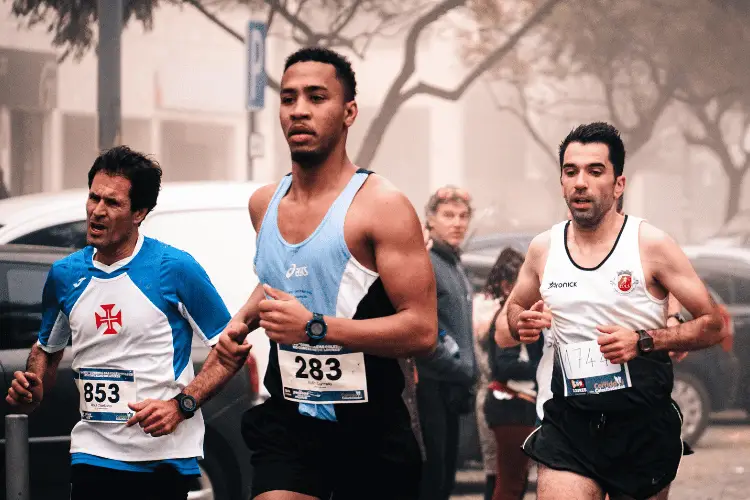“Can you run a marathon without training?” one of my clients asked in the middle of a session.
As someone who values safety over anything else, my first instinct was to respond, “No, of course not.” But that isn’t quite the truth.
It’s entirely possible to run a marathon without prior training. The real question isn’t if you can, but rather if you should.
Running a marathon is far from easy. Without training, you’re potentially signing up for long-term injury, health complications, and a generally miserable experience.
In this article, I’ll discuss the risks and disadvantages of running a marathon without proper training and how to train for a marathon for beginners.
Is It Possible to Run a Marathon Without Training?
Yes, you can run a marathon without prior experience or training. However, doing so comes with several (dangerous) caveats. It can cause long-term joint damage, heart complications, muscle strains, and stress fractures to name a few. It can even be deadly.
If you’re a runner and conditioned to running a 5K or 10K, it’s possible to complete a marathon without long-term side effects. But even then, it’s not something I would recommend.
Running a full marathon without training can leave you fatigued, sore, injured and exhausted for days afterward, turning the experience into a negative one.
Moreover, without proper training, you may not be able to recover fast enough to complete the race. So you’re not only putting yourself at risk for potentially life-long injuries, but you’re also doing it without a payoff. There’s no point and it’s just not worth it.
Dangers of Running a Marathon Without Training
While possible to run a marathon without prior training, the risks outweigh the benefits. Here are the disadvantages of partaking in a marathon with zero training:

Negative Impact On Your Health
Running a marathon is physically and mentally demanding. Those who sign up for a marathon do so months before the event to train their mind and body for the race.
Beginner runners—i.e., people who run less than 20 to 25 miles a week or none for years—need at least four months of training to reduce the risk of injury, hydration issues, and general misery.
Experienced runners can get away with much less, depending on their previous running history and physical state.
Marathon training requires dedication, effort, and motivation. Without it, you’re risking stress fractures, muscle strains, and long-term joint damage.
Increases Your Risk of Injury
Running long distances without proper marathon training increases your risk of injury by up to 50%. Some of the most common injuries associated with the lack of marathon training include:
- Shin splints: pain along the shin bone
- Plantar fasciitis: pain at the bottom of the foot
- Achilles tendinitis: swelling, inflammation, and irritation of the Achilles tendon
- Iliotibial band syndrome (ITBS): pain at the outside of the knee
- Patellofemoral syndrome (PFS): pain at the front of the knee, around the kneecap
- Ankle sprain
According to a study published by the Harvard Gazette, over 75% of runners get injured annually. Those that get injured aren’t new to running, so imagine how significant the number would be if the study calculated the injuries of non-runners.
The injuries listed above belong to a category called overuse injuries. Overuse injuries are sports-related microtraumas that occur when you take on too much physical activity too quickly. It results from doing more than you’re capable of or training without the wrong technique.
Non-runners and beginners have the highest likelihood of sustaining an overuse injury. However, this doesn’t mean that injuries are inevitable for novice runners. This is why training for a marathon is so important: it gives you the chance to protect yourself from injury.
Dehydration or Overhydration
Athletes and experienced runners are more knowledgeable on appropriate ways to hydrate and refuel before, during, and after a run, but novices don’t often have the same luxury. They’d either drink too little or drink too much, resulting in either dehydration or overhydration.
Dehydration is influenced by various factors, including the length and intensity of the run, temperature and humidity, body weight, personal sweat rate, and age. Therefore, hydration differs per person and situation.
Dehydration can lead to muscle cramps, rapid heartbeat, headache, and fatigue. In warm weather, it increases the risk of heat exhaustion, heat stroke, and other heat-related illnesses.
On the other hand, overhydration occurs when a runner drinks too much water during the marathon.
Drinking excess water during the course of a 26-mile race can lead to water intoxication, a condition that causes cells to swell. It can also lead to hyponatremia, characterized by low sodium concentration in the blood. Both can be fatal if not treated immediately.
Training allows you to understand the proper amount of water needed to safely complete a marathon. Inexperienced runners that take more than four hours to finish a marathon tend to fill up on water quickly, putting them at risk for water intoxication and hyponatremia.
Takes Away the Fun
Injury and health issues aside, running a marathon without training just isn’t fun.
Marathons are the ultimate test of human endurance; they can be taxing even for an experienced athlete. Thus, it’s crucial that you take the race seriously and train weeks and sometimes even months in advance.

People who regularly partake in marathons talk about how rewarding and intoxicating it feels to cross the finish line. It makes sense—if you’ve been training for months on end, you’ll undoubtedly feel accomplished when you complete a full-length race.
But if you don’t train, crossing the finish line won’t feel like an accomplishment. You’ll end up asking yourself if the pain, misery, and potential injury were worth it, and if it’s even a good idea to run in one again.
The difference all comes down to training. If you dedicate yourself to a training plan and take the necessary precautions, you’ll rarely find marathons unpleasant.
The race may only take a few hours to complete, but the work that goes into preparing for the event can take weeks if not months. You’re essentially conditioning your body to partake in one of the most challenging races known to mankind—that’s not to be taken lightly!
Can You Die Running a Marathon Without Training?
It’s a grim thought: dying in an event that hundreds, if not thousands, of people participate in regularly. Unfortunately, death in both half-marathons and full-marathons is a real and terrifying possibility.
Running a marathon without training can lead to serious complications such as heart scarring, renal kidney failure, and sudden cardiac death.
Aside from the Greek messenger Pheidippides, who ran the first-ever marathon and died from exhaustion, there are several accounts of deaths caused by the event.
In the first three decades of the London Marathon—the 2nd largest annual road race in the UK—at least 10 competitors died, eight of which experienced cardiac arrests during or shortly after the race.
The most recent case of marathon death occurred at the TCS London Marathon of 2022, where a 36-year-old man collapsed a few miles before completing the race.
The ambulance arrived three minutes after he collapsed, but he, unfortunately, lost his life in the hospital.
Marathon deaths are rare. In a study that looked into the records of 10.9 million marathon runners, the death rate is 1 per 260,000 participants. The study showed that out of all participants, 59 experienced cardiac arrests and 42 of them passed away.
Most of these deaths were caused by the build-up of lactic acid in the blood, which arises when the heart is in distress and can’t pump enough blood. Other causes of death include dehydration, heat stroke, exhaustion, and emotional stress.
People Who Have Completed a Marathon Without Training
It’s not impossible to complete a marathon without training, as demonstrated by the people below.

John and Edward Grimes
Irish twins John and Edward Grimes joined the 2012 Los Angeles marathon on a whim. They got off their flight, saw the event, and decided, why not? So not only did they not train before the event, but they were also exhausted from traveling from one country to another.
But here’s the thing: John and Edward Grimes are well-known dancers. They also used to compete in cross country and mountain races and regularly ran with the athletics club.
The brothers are physically and mentally healthy, which allowed them to complete the marathon with little to no issues. They were also 20 years old when they competed, giving them the advantage of youth.
Sean Ogle
Sean Ogle completed the Eugene Marathon in Oregon in five hours and thirty minutes. What people were unaware of was that Ogle was a generally athletic individual. He used to train for the event but was stopped by a shin injury and a sudden influx of work at his job.
Ogle didn’t let his lack of training prevented him from competing and joined the marathon. He crossed the finish line by utilizing a walk-run strategy, where he ran the first 18 miles and jogged the rest of the way through.
David Bedford
David Colin “Dave” Bedford is a long-distance athlete known for setting a 10,000-meter record in 1973.
When dared to compete by sports commentator David Coleman, Bedford took on the challenge and ran in the London Marathon. He didn’t train for the event, but as a professional athlete, he found no issues competing.
Even so, Coleman didn’t finish the race unscathed as he was seen vomiting on the roadside past the halfway point. This is likely because he had one too many piña coladas the night before the competition, which he usually wouldn’t indulge in before the race.
What did the Grimes twins, Sean Ogle, and David Bedford have in common? That’s right: they aren’t inexperienced runners.
Though they didn’t train for the marathon they participated in, they were able to complete the race without repercussions because they were fit and healthy. The same can’t be said for sedentary individuals and those who aren’t used to running long distances.
How to Prepare for a Marathon: A Guide for Beginners
Now that we’ve established why you shouldn’t run a marathon unprepared, here’s what you should do to safely complete a marathon as a beginner:
- Build your weekly mileage to 50 miles over four months with about three to five runs each week. This should give you enough time to work on your stamina, strength, and endurance.
- If possible, run a few shorter races—5Ks, 10Ks, or even half a marathon—before partaking in a marathon. Doing so gives you a general idea of how the race will go and strategies to use in the event.
- Consult a physician months before the marathon to ensure you’re safely able to compete.
- Don’t overwork yourself during training. Allow your muscles to recover from taxing workouts to reduce the risk of overuse injuries.
- With training, you’ll be able to run long distances without the aid of water stations. Even so, you need to learn how to properly hydrate. Calculate how much water you need to drink before, during, and after your runs to ensure you don’t overhydrate or underhydrate.
Final Thoughts
While it’s possible to run a marathon without training, it’s far too risky to attempt.
Running a full marathon without prior training can lead to muscle strains, long-term joint damage, stress fractures, heart complications, and kidney failure to name a few.
It also takes away the fun of the sport. Instead of leaving you with a pleasant experience, the resulting over-exhaustion and fatigue will leave a sour taste in your mouth and turn you away from joining again.
If there’s anything to take away from this article, it’s this: unless you’re a professional athlete or an experienced runner, you shouldn’t attempt to run a marathon without training. Running a marathon without training is like jumping in a pool without knowing how to swim. The consequences can be severe and potentially even fatal.


